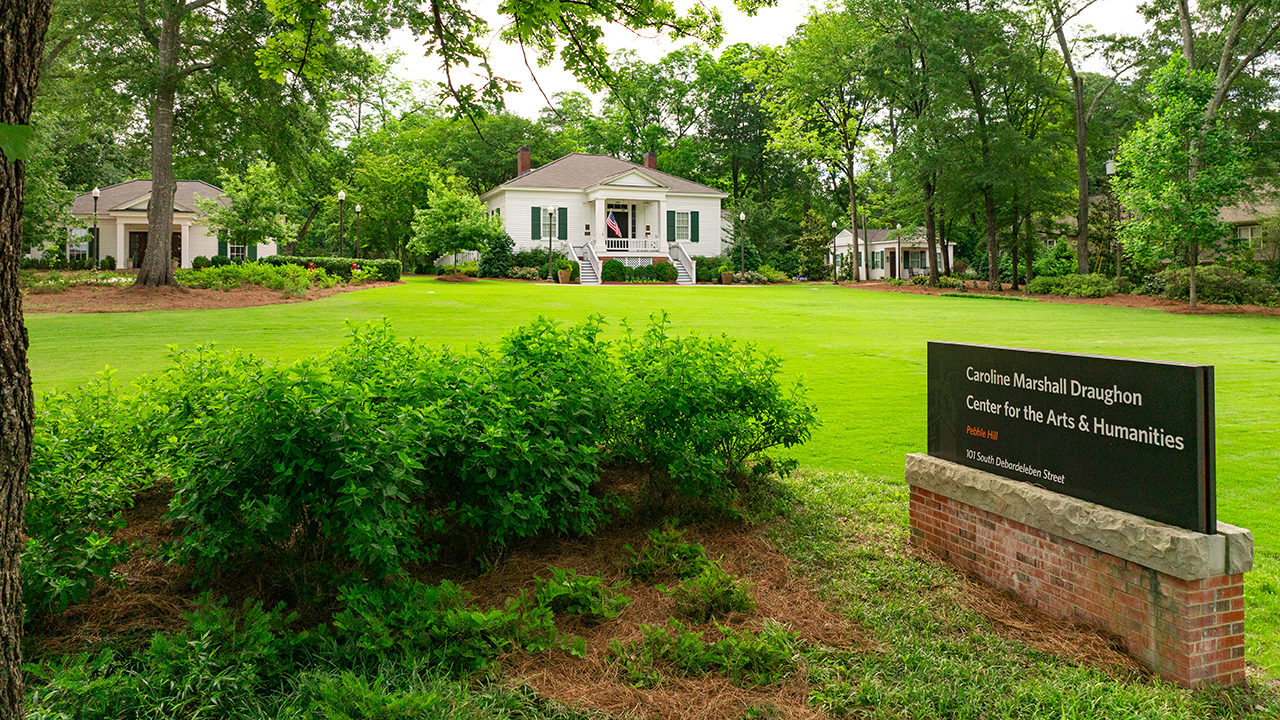content body

Pebble Hill was donated to Auburn University from AuburnBank in 1984.
Nearly 40 years ago, the stars aligned just right for Auburn University’s fledgling public humanities initiative.
AuburnBank had just donated the Scott-Yarbrough House at Pebble Hill, one of the community’s most historic homes, to the university in 1984. And Auburn’s upstart public humanities committee – with big plans for establishing a center – just so happened to need a space. It was the perfect fit.
Today, the Caroline Marshall Draughon Center for the Arts & Humanities, housed at Pebble Hill, is no upstart. It’s a proven partner in strengthening the bonds between Auburn University and the public by creating opportunities for people to explore individual and collective experiences, values and identities through the creativity of the arts and the wisdom of the humanities.
The center hosts more than 200 programs and events each year, and Pebble Hill is an integral part of many of those activities.
“There's a real sense of responsibility to care for it and to interpret Pebble Hill to the best of our ability,” said Mark Wilson, the center’s director. “We’re honored that we get a chance to do that.”
Each year, thousands of visitors engage with the center’s programming, which includes conferences, workshops, school field trips, concerts, book talks, and poetry readings, among other events.
Pebble Hill is an important link to the past for the community – offering opportunities for visitors and students to learn about the area’s native Creek Indians, the founders and builders of the town of Auburn, and the enslaved people who once lived here.
As a Greek Revival style cottage built in 1847, Pebble Hill also offers a glimpse into the unique architecture of the time.
“Anyone who's considering a gift of property to Auburn can rest assured that any type of gift, especially of property, has the potential to benefit future generations."

Built in 1847, Pebble Hill is a Greek Revival style cottage that is on the National Register of Historic Places.
The Draughon Center’s impact goes far beyond Pebble Hill, though. The center’s leadership is active in the Alabama Historical Association, for which Pebble Hill serves as the management office.
“We have an endowed series for state and local history that we utilize to assist public libraries and historical societies around the state with speakers,” Wilson said. “We always have one foot outside of Auburn trying to represent the university in partnership with these organizations so that they can benefit from the wisdom of the academy and all of the research and scholarship that takes place here.”
The center has benefited from continued philanthropy that has expanded Pebble Hill’s footprint, which includes a meeting room and guest house on the property.
Ann Draughon Cousins ’54 created an endowment to care for Pebble Hill and support its programming in honor of her mother, former Auburn First Lady Caroline Marshall Draughon. The Lowrey Guest House was built in 2022 thanks to the generosity of Jacob Lowrey III ’69.
For all that the Draughon Center has achieved since its founding, from creating vivid connections to the past or enriching the public through the humanities, it all started with a gift of real estate.
Real estate donations to Auburn University are typically either held to further Auburn’s mission or sold to create a meaningful gift in support of the donor’s favorite program or area of interest. There are several ways to make a gift of real estate, including:
- Donating a property outright
- Leaving a gift of real estate in a will or trust
- Creating a retained life estate
“Anyone who's considering a gift of property to Auburn can rest assured that any type of gift, especially of property, has the potential to benefit future generations,” Wilson said.




